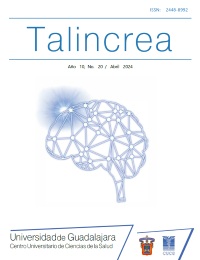Editorial
DOI:
https://doi.org/10.32870/talincrea.v11i2.203Abstract
Talent, Intelligence, and Creativity: International Perspectives for a Transformative Education.
In an increasingly interconnected and complex world, recognizing, enhancing, and supporting the
different manifestations of talent, intelligence, and creativity is a challenge that crosses borders. In this edition of Talent, Intelligence, and Creativity, we bring together seven contributions from specialists from Mexico, Spain, Brazil, and Portugal, who address, from different perspectives and methodologies, the challenges and opportunities of a more humane, inclusive, and personalized education.
From Spain, the psychometric study of the Inventory of Psychological Characteristics Associated with Academic Performance in university students provides valuable tools for understanding the psychological factors that drive academic success, such as cognition, motivation, and persistence.
At the same time, Mexican research on math anxiety reveals how intelligence, gender, and individual perceptions influence learning in traditionally feared areas, highlighting the importance of sensitive and differentiated pedagogical interventions.
In basic education, attention to double exceptionality (Gifted Intellectual Abilities and ADHD) highlights the urgent need for teacher training. The results of a study in Mexico show that many teachers lack the necessary tools to adequately identify and serve these students, although they also show a great willingness to train and improve their practice.
Complementing this perspective, research in the Basque Country (Spain) analyzes the learning processes of gifted students, revealing a marked tendency toward deep and intrinsically motivated learning approaches, reinforcing the need for methodologies that stimulate curiosity and critical thinking. From Brazil, an analysis of curricular flexibility and creativity highlights how personalized teaching—supported by educational technologies and active methodologies—becomes crucial to developing students' potential in a traditionally rigid system, opening up new possibilities for building a more dynamic and inclusive education.
The article on creative genius in architectural design reminds us that the creative act is a constant dialogue between emotion, rational analysis, and social context. This transdisciplinary approach invites us to consider creativity not only as an artistic skill, but as a vital competency for solving complex problems in any field.
Finally, a systematic review of intellectual giftedness offers a comprehensive look at the importance of understanding and addressing giftedness beyond academic performance, emphasizing socio-emotional aspects and the need for ongoing teacher training.
Through these seven articles, this edition reflects an international vision that inspires us to build an education that celebrates diversity, values talent in all its forms, and fosters creativity capable of transforming realities. Welcome to this international edition of Talent, Intelligence and Creativity.





